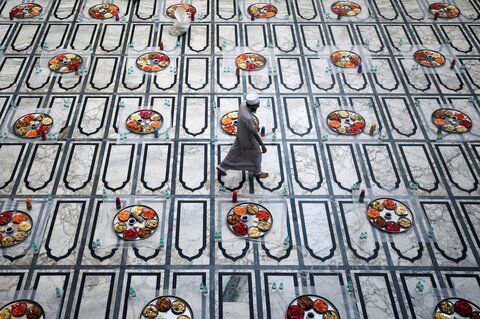Hawzah News Agency - We are now officially in the last half of Ramadan, and many Muslims across Turkey and the world are counting down the days to Ramadan Bayram, also known as Eid al-Fitr. Although there are only a number of days left to fast, medical experts are warning that around this point, they begin receiving a lot of complaints from their patients, especially problems related to the stomach such as digestive issues, ulcers or acid reflux. These usually stem from not following a balanced diet, skipping one of your two main meals or eating highly acidic foods.
To make things harder, this year the novel coronavirus has been thrown into the mix. Following a balanced diet, though imperative in all conditions regardless of whether you are fasting or not, is of great importance not only to be more energetic while fasting but also to maintain your immunity.
So, if you have been having trouble sticking to your fast or having digestive issues and would like to follow a proper diet as much as possible to keep your body's defenses high, here are eight tips from nutrition and dietetics expert Sıla Bilgili Tokgöz.
Wake up for sahur
“While fasting, sahur (the meal eaten before dawn during Ramadan) will be one of your main meals and will replace your breakfast. Therefore, be sure to wake up for Sahur. Skipping Sahur may also suppress your immune system. Also, by having this early morning meal, you will shorten the time you spend hungry and maintain your metabolic rate. Otherwise, you may feel weak and fatigued or suffer from low blood sugar and constipation during the day,” Tokgöz said.
Essentials of sahur, from A to Z
Tokgöz says that for the body and especially the immune system, three vitamins and minerals are of utmost importance: zinc, vitamin A and vitamin C. While zinc helps our immune system form a shield against pathogens, vitamin C increases the body's resistance with its antioxidant properties. "Vitamin A deficiency can lead to disruptions in the way the immune system works, making infections progress more easily," she said.
Zinc is found mostly in whole grain products, oil seeds such as almonds and pumpkin seeds. By consuming whole grain bread or homemade wholegrain cheesy poğaças, you can get the amount of zinc you need and be satiated for longer." For snacks, porridge or a cup of unsalted pumpkin seeds would meet your zinc needs while strawberries, kiwis, plums, blueberries and mulberries would be great for vitamin C, she said.
To stay fuller longer, another important food group you must not overlook is protein. Foods with high protein content such as eggs, cheese and milk are great options for Sahur, she said.
“Additionally, eggs, milk and dairy products are also high in vitamin A, an important micronutrient for the immune system,” she added.
Tokgöz also advised those fasting to include plenty of antioxidant-rich foods in their diet during Ramadan, such as beetroot, red cabbage, radishes, spinach, broccoli, brussels sprouts and red pepper, at Iftar time.
Avoid foods that trigger thirst
It is very important to stay away from excessively fatty and salty foods that trigger thirst during sahur because later on in the day while you are fasting, your cells will be begging for water. Likewise, very spicy foods and caffeinated beverages can also make you more dehydrated. Consuming excessively salty foods can also cause your body to retain water and lead to edema. Delicatessen or charcuterie products such as olives, cheese, sausage and salami have a high salt content. It's best if you consume less salty cheeses during your meals, and perhaps soak olives in water to get rid of the excess salt, Tokgöz suggested.
Divide Iftar into halves
Stuffing your empty stomach at Iftar all at once will cause your blood pressure and sugar to spike, as well as lead to gastrointestinal problems such as indigestion. Here, Tokgöz recommends waiting around 20 minutes after eating your soup or starter before you eat your main meal. This effectively splits your Iftar into two and is easier on the stomach, she said. Continue eating at regular intervals from Iftar to Sahur. Another point to be wary of, according to Tokgöz, is cooking methods such as frying, which make it harder to control your caloric intake and may upset your stomach.

